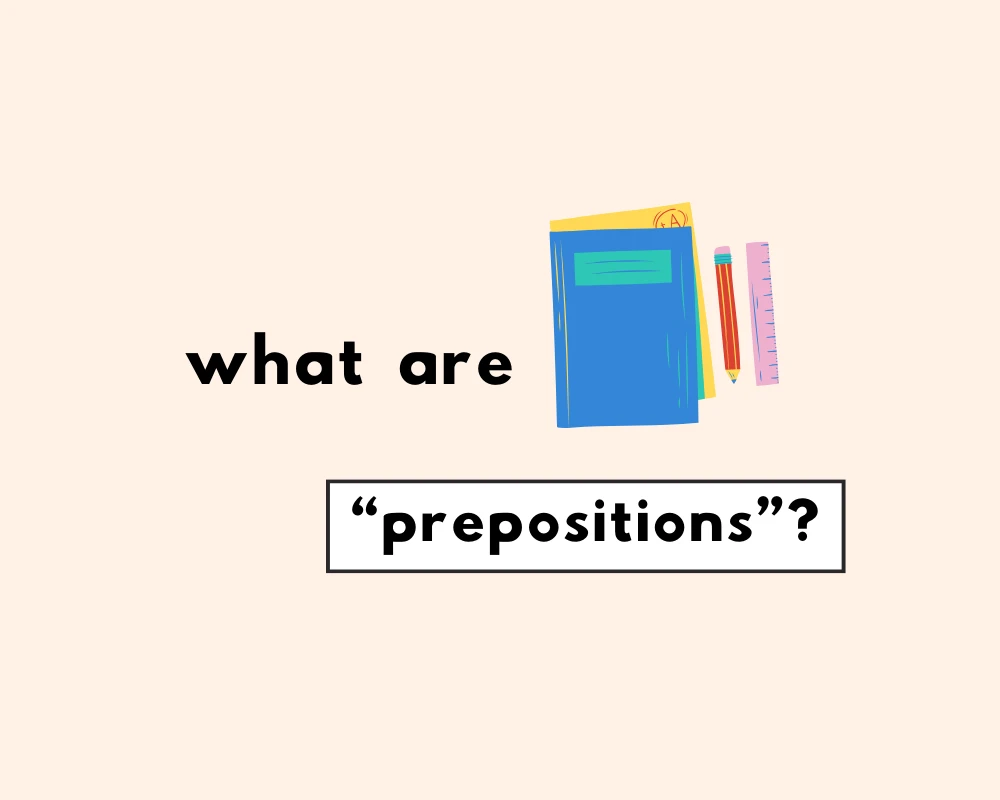Contents
Toggle
Prepositions (explained, with examples)
Prepositions are one of the main parts of speech in English; they’re utility words that show how elements within sentences relate to each other. We use prepositions to indicate place, time, direction, and sometimes abstract connections.
Though they can certainly be a trickier part of speech to get the hang of, practice and reading more about them is the best method to understanding how we use prepositions in writing and conversation (which, if you’re reading this, you’re already step ahead!)
What are prepositions? (And how to use them)
Prepositions are words that we use before nouns or pronouns to show how they connect or stand in regards to something else previously mentioned. Typically, prepositions will come before the word or phrase it associates with, (as its name infers; regarding, pre–position, or “that which is placed before”).
- The cat jumped off the bed.
- There’s a fox in the yard.
- She feels ill from all the candy.
The first sentence uses the preposition “off” to relate the cat’s jumping with the object ‘bed’, and so it connects verbs with nouns.
In the second sentence, “in” shows a relation between two nouns: the fox and yard. The third sentence illustrates how the adjective ‘ill’ relates to the ‘candy’ (a noun).
So, prepositions can connect elements or parts of sentences with each other; such as nouns with nouns, verbs with nouns, and adjectives with nouns.
A noun or pronouns used with a preposition is called its object (or a prepositional object). So, from the second sentence above, (there’s a fox in the yard), the noun ‘yard’ is governed by the preposition and is its object. Typically, prepositions will come before their object, though sometimes they may come after:
- What are you looking at?
- What are you thinking of?
Main types of prepositions
Compound prepositions are formed by connecting a preposition (such as ‘a’ or ‘be’) with a noun, adjective or adverb:
- about
- above
- across
- along
- amidst
- amongst
- around
- before
- behind
- beneath
- beside
- between
- below
- inside
- outside
- underneath
- within
- without
Phrase prepositions uses a group of words to form a single prepositional phrase:
- according to;
- in addition to;
- along with;
- because of;
- by means of;
- by virtue of;
- by way of;
- for the sake of;
List of common prepositions
There are over a hundred prepositions in English, so this is by no means an exhaustive list. Some of the most common include:
- for,
- by,
- from,
- of,
- as,
- with,
- about (to signal a relationship or tie)
- to,
- into,
- towards,
- through,
- across,
- up,
- down,
- around,
- past (used to indicate movement)
- under,
- over,
- above,
- below,
- between,
- in,
- out,
- on,
- at,
- by (signal location)
- in (month/year),
- on (day),
- at (time),
- before,
- during,
- after,
- since, until (time within a month/year)
Practice questions: prepositions
| Complete the sentences using the correct prepositions: | Answer options: |
|---|---|
| 1. My best friend lives ______ Strathearn Road. | a. in b. by c. on d. at |
| 2. I’ll be ready to leave ____ about twenty minutes. | a. in b. by c. on d. at |
| 3. Since meeting his girlfriend, Jake never seems to be ______ home. | a. in b. by c. on d. at |
| 4. I really care ___ what happens to him. | a. of b. to c. about d. at |
| 5. Please apologize to them ___ me. | a. in b. for c. on d. at |
| 6. I’m very satisfied ___ my exam results. | a. on b. at c. by d. with |
| 7. I’ve noticed a big improvement ___ your English. | a. with b. on c. by d. in |
| 8. She’s extremely appreciative ___ all that you have done. | a. of b. to c. about d. at |
| 9. I will wait ______ 6:30, but then I’m going home. | a. from b. until c. at d. for |
| 10. My best friend, John, is named ______ his great-grandfather. | a. before b. from c. beside d. after |
Answers
- c
- a
- d
- c
- b
- d
- d
- a
- b
- d
Read about the other parts of speech
- Nouns
- Adjectives
- Pronouns
- Verbs
- Adverbs
- Interjections
- Conjunction
Sources
- High School English and Grammar Composition, P.C. Wren
- Scribbr on prepositions.










